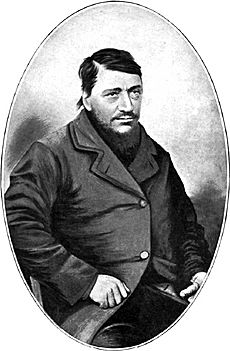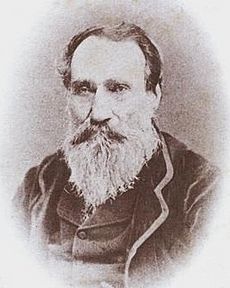Transvaal Civil War facts for kids
Quick facts for kids Transvaal Civil War |
|||||||
|---|---|---|---|---|---|---|---|
|
|||||||
| Belligerents | |||||||
| Commanders and leaders | |||||||
The Transvaal Civil War was a series of small fights and disagreements that happened in the early 1860s. This conflict took place in the South African Republic, also known as the Transvaal. This area is now part of modern-day South Africa.
The war started after the British government said that the Boer settlers in the Transvaal were independent in 1854. The Boers then split into different political groups. The fighting ended in 1864 when a peace agreement, called an armistice, was signed. This agreement was made under a karee tree near where the town of Brits is today.
Contents
Why the War Started
In 1859, the president of the Transvaal, Marthinus Wessel Pretorius, was asked to become president of the Orange Free State. Many people there wanted the two republics to join together.
However, the Transvaal's constitution said that its president could not hold another job in a different country. Even so, Pretorius accepted the offer and won the election in the Orange Free State.
The Transvaal's government, called the Volksraad (which was like their parliament), tried to fix this problem. They gave Pretorius six months off, hoping a solution would appear. Pretorius then left for the Orange Free State. He appointed Johannes Hermanus Grobler to be the acting president while he was away.
Leaders Disagree

Paul Kruger, who was a military leader, and other Transvaal officials did not like Pretorius being president of two places at once. They worried that Britain might cancel the agreements that made the republics independent.
So, on September 10, 1860, the Volksraad told Pretorius he had to choose one job. Surprisingly, he quit as president of the Transvaal and stayed in the Orange Free State.
After this, a man named Stephanus Schoeman tried to take over as acting president by force. But Kruger convinced him to let the Volksraad decide. The Volksraad then removed Schoeman from his position. Willem Cornelis Janse van Rensburg became the new acting president. A new election was planned for October 1862.
Kruger was asked to run for president, but he said he couldn't because of his church beliefs. Van Rensburg then helped pass a law that allowed people from all Reformed churches to hold political office.
The Fighting Begins
In October 1862, Schoeman gathered a group of fighters near Potchefstroom. But Kruger's forces defeated them. Schoeman returned with a larger group, and Kruger and Pretorius met to talk. They agreed to hold a special court in January 1863 to discuss the problems. They also agreed to have new elections for president and military leader.
Schoeman was found guilty of rebelling against the state and was sent away. In May, the election results were announced. Van Rensburg became president, and Kruger became the military leader. Both were disappointed that not many people voted. So, they decided to hold another election.
New Elections and End of War
This time, Pretorius, who had left his job in the Orange Free State, ran against Van Rensburg. More people voted in this election. On October 12, the Volksraad announced that Van Rensburg had won again. Kruger was also re-elected as military leader by a large number of votes.
The civil war finally ended when Kruger defeated a group of fighters led by Jan Viljoen. This battle happened at the Crocodile River on January 5, 1864. Viljoen's group supported Pretorius and Schoeman.
After this, elections were held one more time. This time, Pretorius won against Van Rensburg. Kruger was re-elected as military leader with more than two-thirds of the votes.
After the War
The civil war caused a lot of economic problems in the Transvaal. The government found it harder to control local groups. However, some areas like Lydenburg and Utrecht now accepted the central government.
By 1865, there were new tensions with the Zulus in the east. Also, war had started again between the Orange Free State and the Basotho people. Pretorius and Kruger led about 1,000 men south to help the Orange Free State.
The Basotho were defeated, and their leader gave up some land. But the president of the Orange Free State decided not to give any of the captured land to the Transvaal fighters. The Transvaal men were very upset and went home, even though Kruger tried to keep them there.
Kruger's Injury and Zoutpansberg
In February 1866, after a meeting, Kruger's cart overturned on his way home. He broke his left leg. He managed to right the cart on one leg and continued his journey. This injury kept him from working for nine months, and his left leg was slightly shorter afterward.
In 1867, Kruger was sent to bring order back to Zoutpansberg. He had about 500 men, but they didn't have much ammunition, and the soldiers were not well-disciplined. When they reached Schoemansdal, which was threatened by a local chief, Kruger and his officers decided they couldn't hold the town. They ordered everyone to leave, and the chief then burned the town.
Losing Schoemansdal, which was a rich settlement, was a big embarrassment for many Boers. The Transvaal government officially said Kruger was not to blame. They said he had to leave Schoemansdal because of things he couldn't control. However, some people still thought he gave up the town too easily. Peace returned to Zoutpansberg in 1869 with help from the republic's Swazi allies.
Later Years
Pretorius stepped down as President in November 1871. In the 1872 election, Kruger's chosen candidate lost to Thomas François Burgers. Burgers was a church minister known for his good speeches, but some of his ideas were seen as too liberal.
Kruger publicly accepted Burgers's election. He said that as a good citizen, he would follow the majority's vote, but he had serious concerns about the new president. Kruger especially disliked Burgers's new education law, which limited religious teaching in schools. Kruger felt this was wrong.
Because of this and his family getting sick, Kruger lost interest in his job. In May 1873, he asked to leave his position, and Burgers quickly agreed. The job of military leader was then removed the next week. Kruger moved to Boekenhoutfontein and stayed out of public life for a while.
See also
- First Boer War, 1880–81
- Second Boer War, 1899–1902
Sources
 | John T. Biggers |
 | Thomas Blackshear |
 | Mark Bradford |
 | Beverly Buchanan |


